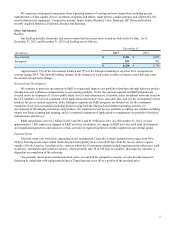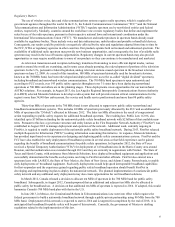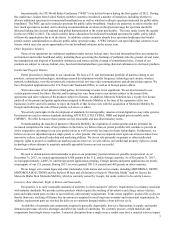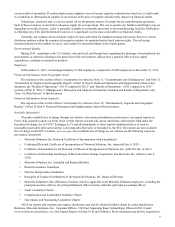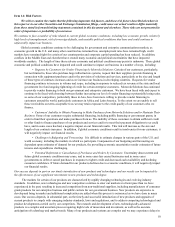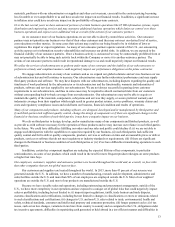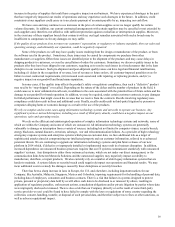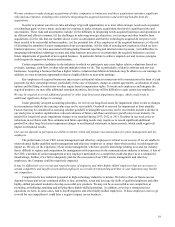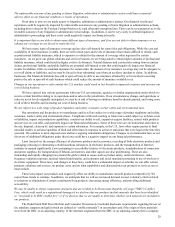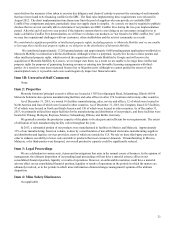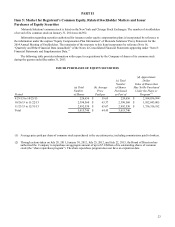Motorola 2013 Annual Report Download - page 17
Download and view the complete annual report
Please find page 17 of the 2013 Motorola annual report below. You can navigate through the pages in the report by either clicking on the pages listed below, or by using the keyword search tool below to find specific information within the annual report.15
exchange regulations and repatriation delays and costs, which could negatively impact our sales, profitability and financial
flexibility.
We have sizeable sales and operations in our Europe and Africa, Asia and Middle East, and Latin America regions. A
significant amount of this business is transacted in local currency. As a result, our financial performance is impacted by
currency fluctuations. We are also experiencing increased pressure to agree to established currency conversion rates and cost of
living adjustments as a result of foreign currency fluctuations.
A large percentage of our cash and cash equivalents is currently held outside the U.S., while many of our liabilities, such
as our public debt, the majority of our pension liabilities and certain other cash payments, such as dividends and share
repurchases, are payable in the U.S. While we regularly repatriate funds with minimal adverse financial impact, repatriation of
some of the funds has been and could continue to be subject to delay for local country approvals and could have potential
adverse tax consequences. In addition, foreign exchange regulations may limit our ability to convert or repatriate foreign
currency. As a result of having a lower amount of the cash and cash equivalents in the U.S., our financial flexibility may be
reduced.
Tax matters could have a negative impact on our financial condition and results of operations.
We are subject to income taxes in the U.S. and numerous foreign tax jurisdictions. Our provision for income taxes and
cash tax liability may be negatively impacted by: (i) changes in the mix of earnings taxable in jurisdictions with different
statutory tax rates, (ii) changes in tax laws and accounting principles, (iii) changes in the valuation of our deferred tax assets
and liabilities, (iv) failure to meet commitments under tax incentive agreements, (v) discovery of new information during the
course of tax return preparation, (vi) increases in nondeductible expenses, or (vii) difficulties in repatriating cash held abroad in
a tax-efficient manner.
Tax audits may also negatively impact our financial condition and results of operations. We are subject to continued
examination of our income tax returns, and tax authorities may disagree with our tax positions and assess additional tax. We
regularly evaluate the likelihood of adverse outcomes resulting from these examinations to determine the adequacy of our
provision for income taxes. There can be no assurance that the outcomes from these continuing examinations will not have a
negative impact on our future financial condition and operating results.
Failure of our suppliers, subcontractors, distributors, resellers and representatives to use acceptable legal or ethical business
practices and adhere to our Supplier Code of Conduct could negatively impact our business.
It is our policy to require our suppliers, subcontractors, distributors, resellers, and third-party sales representatives
(“TPSRs”) to operate in compliance with applicable laws, rules and regulations regarding working conditions, employment
practices, environmental compliance, anti-corruption and trademark and copyright licensing. However, we do not control their
labor and other business practices. If one of our suppliers, subcontractors, distributors, resellers, or TPSRs violates labor or
other laws or implements labor or other business practices that are regarded as unethical, the shipment of finished products to
us could be interrupted, orders could be canceled, relationships could be terminated and our reputation could be damaged. If
one of our suppliers or subcontractors fails to procure necessary license rights to trademarks, copyrights or patents, legal action
could be taken against us that could impact the salability of our products and expose us to financial obligations to a third-party.
Any of these events could have a negative impact on our sales and results of operations.
We rely on third-party dealers, distributors, and retailers to sell many of our products.
In addition to our own sales force, we offer our products through a variety of third-party dealers, distributors and
retailers. These third-parties may also market other products that compete with our products. Failure of one or more of our
dealers, distributors or retailers to effectively promote our products could affect our ability to bring products to market and have
a negative impact on our results of operations.
Some of these third-parties are smaller and more likely to be impacted by a significant decrease in available credit that
could result from a weakness is the financial markets. If credit pressures or other financial difficulties result in insolvency for
third-party dealers, distributors or retailers and we are unable to successfully transition end-customers to purchase our products
from other third-parties or from us directly, it may cause, and in some cases has caused, a negative impact on our financial
results.
Our future operating results depend on our ability to purchase a sufficient amount of materials, parts and components, as well
as services and software to meet the demands of our customers and any disruption to our suppliers or significant increase in
the price of supplies could have a negative impact on our results of operations.
Our ability to meet customers' demands depends, in part, on our ability to timely obtain an adequate delivery of quality
materials, parts and components, as well as services and software from our suppliers. In addition, certain supplies are available
only from a single source or limited sources and we may not be able to diversify sources in a timely manner. If demand for our
products or services increases from our current expectations or if suppliers are unable to meet our demand for other reasons,
including as a result of natural disasters or financial issues, we could experience an interruption in supplies or a significant


